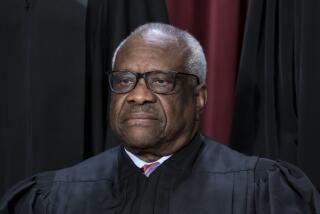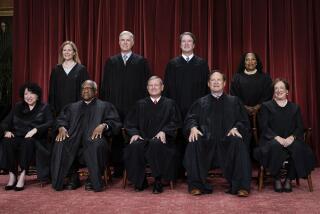House Panel to Subpoena Marcos Papers If Access Is Blocked by Court Moves
- Share via
WASHINGTON — A House subcommittee investigating the hidden U.S. assets of former Philippine President Ferdinand E. Marcos hopes to examine 1,500 pages of Marcos’ private papers this weekend despite renewed efforts by Marcos to block their release, the panel’s chairman, Rep. Stephen J. Solarz (D-N.Y.), said Friday.
But if Marcos succeeds, Solarz said, the House Asian and Pacific Affairs subcommittee will subpoena the papers in a Tuesday meeting, and a House attorney said he is confident that the subpoena would take legal precedence over any restraining order.
After a meeting Friday with investigators from the government of new Philippine President Corazon Aquino, Solarz said it may be “possible to work out an arrangement” with the Reagan Administration to release the documents, which have been held by the U.S. Customs Service since Marcos fled Manila for Guam and then Hawaii late last month.
The subcommittee has asked the Customs Service for the papers, which are reported to contain details of foreign investments--by some estimates up to $10 billion--that Marcos and his family allegedly made with pilfered Philippine money. The documents’ transfer was delayed Thursday when Marcos’ Washington-based attorneys persuaded a federal district judge in Honolulu to temporarily bar the agency from releasing the papers.
This afternoon, Marcos’lawyers are scheduled to ask the Court of International Trade in New York to issue a second restraining order and to order the Customs Service to return to Marcos all private papers and other seized assets. Unlike the Honolulu federal court, the New York court deals specifically with Customs Service legal issues.
“He wants his property back, his money back, his clothes and jewelry back, and other personal effects,” said attorney Stanton Anderson. “And he wants his papers back. Part of his point is he doesn’t know what’s in the papers.”
Marcos “left very rapidly, and others in the staff boxed these papers up,” Anderson said, “and frankly, he doesn’t know what’s in them.”
Anderson said Marcos’ attorneys also would seek to clarify “some vagueness” in the Honolulu order that apparently allows federal officials to hand over the Marcos papers and other assets to authorized investigators, including those from the House subcommittee.
The Honolulu restraining order exempts from its scope “those persons entitled to access pursuant to lawful subpoena . . . or pursuant to the laws or treaties of the United States.” Solarz said Friday that House lawyers are studying whether the “treaties” clause might allow Philippine government investigators on the trail of Marcos’ wealth to examine the papers immediately, despite the court order.
Papers May Be Key
Jovita R. Salonga, chairman of a commission set up by President Aquino to investigate the Marcos holdings abroad, said Friday after conferring privately with Solarz that the seized Marcos papers may provide the key to recovery of the supposedly stolen billions. Salonga and Solarz pledged to share information on the Marcos assets in a joint effort to return any illegally obtained money to the Philippines.
“It is of very great importance to us to be able to recover the ill-gotten wealth in the Philippines and abroad,” Salonga said. “Our economy has been shattered. . . . We would like to think we can give substance to the concept of public office being a public trust.”
Solarz said the success of Salonga’s effort “may well depend on our ability to obtain access to the 1,500 documents Marcos brought with him.”
A formal hearing on efforts to make permanent the Honolulu restraining order will not take place until Friday, but Solarz said he is hopeful that the White House will use the escape clauses in the order to allow his subcommittee immediate access to the papers.
Steven Ross, counsel for the House of Representatives, noted that the Hawaii order “makes it very clear that the documents are to be turned over in response to a subpoena.” Although Marcos’ lawyers may succeed in removing those clauses through a restraining order obtained in New York, he said, “any (order) which sought to prevent Congress from obtaining this material would be invalid.”
More to Read
Get the L.A. Times Politics newsletter
Deeply reported insights into legislation, politics and policy from Sacramento, Washington and beyond. In your inbox twice per week.
You may occasionally receive promotional content from the Los Angeles Times.










